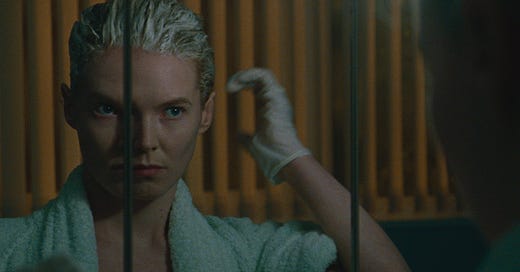Blue Jean
Rosy McEwen gives an empathetic performance as a closeted teacher trying to navigate a moral quandary involving a student in 1980s England.
It’s strange to think how things that were commonplace and unremarkable a relatively short time ago are now considered strange and alien. For a long time there were a lot of books, shows and movies about gay people having to live their lives “in the closet,” aka presenting as heterosexual while they expressed their most intrinsic nature in private settings.
As “out” has become the default for LGBTQ people from an early age — to the point nobody even really uses that term anymore — the reality of this lived experience has dissipated from the public consciousness.
“Blue Jean,” a new drama set in 1980s England, brings empathy and immediacy back to this life. It’s fictionalized, but loosely based on real gay teachers who worried for their careers and very identity in the face of Section 28, legislation that banned the ‘promotion of homosexuality’ in U.K. schools. It was in effect until 2003.
Of course, it’s not hard to see the connection to the current contretemps on these shores in the ongoing, and incredibly unnecessary, culture wars.
Rosy McEwen plays Jean, a young physical education teacher in a public school. She’s good at her job, has a comfortable flat and car, and seems content in her own skin. She has a supportive group of fellow lesbian friends who hang out, drink, play pool and occasionally hook up with each other.
Jean is in a committed relationship with Viv (Kerrie Hayes), who wears the stereotypical “dyke” uniform proudly: buzzcut hair, leather, tattoos, piercings. We get the sense that Jean is relatively new to this community, and was introduced to it by Viv.
She’s a pilgrim, really, wandering between two worlds.
As you might expect, there is some tension in the couple about Jean being closeted. She doesn’t like for them to be seen together in straight hangouts, while Viv glares at or mocks anyone who gawks at her. Jean hasn’t told her coworkers or even her family about her sexuality, though there is an unspoken understanding between her and her married sister that she will be accepted so long as she keeps her real self private.
The arrival of a new student, Lois (Lucy Halliday), has ripple effects in the school that will eventually become a storm that ensnares Jean and disrupts her entire life.
Encouraged by Jean to join the basketball team, Lois quickly becomes a target of bullying from the other girls, particularly Siobhan (Lydia Page), a red-headed instigator. They call her gay, a pretty standard taunt at the time, initially as a joke but something about it sticks. It’s possible Lois herself didn’t recognize her attraction to other girls before this.
Lois looks to Jean to be her protector and mentor, but is rebuffed. Jean is very careful not to get too close to anyone or show anything about herself to the students or other teachers, making a point not to linger in the locker room when the girls are showering and changing. Lois represents a threat to the cautious life she’s constructed for herself.
Jean is also worried that the girl is forming an attachment to her, something that quickly ramps up to near-terror when Lois turns up at the gay bar where she hangs out. Events reach a critical point where Jean must make a decision, and live with its aftermath.
Writer/director Georgia Oakley, in her first feature film behind the camera, approaches the material with great reserves of sensitivity and emotionality. Whenever we’re tempted to judge Jean — for her actions or inactions — we’re made to stand in her shoes and feel what she does. In a time and place where speaking your truth could lead to instant ostracism, her instinct to stay quiet and fit in are strongly relatable.
Oakley shoots McEwen as an almost transparent figure, with her short bleached hair and colorless, shapeless clothing — a ghost of a woman passing through this life. I noticed the similarity in the way both Jean and Lois wear their hair tousled hanging into their eyes, as if trying to hide themselves. For Jean, it’s a conscious choice, but Lois is still finding her way through the tidelands.
I liked a lot of things about “Blue Jean,” though it feels like less than the sum of its parts. The relationship between Jean and Viv registers as contrived and recycled: we know every step of their dance before it is taken. There are also some allusions to Jean’s previous life, including some important trauma that impacted the person she is today, that needed to be fleshed out.
“Blue Jean” is still a worthy film for taking us back and showing how very different things could be not that long ago. The world is always changing, sometimes for the better and sometimes not, and we either learn to ride the waves or sink under them.





